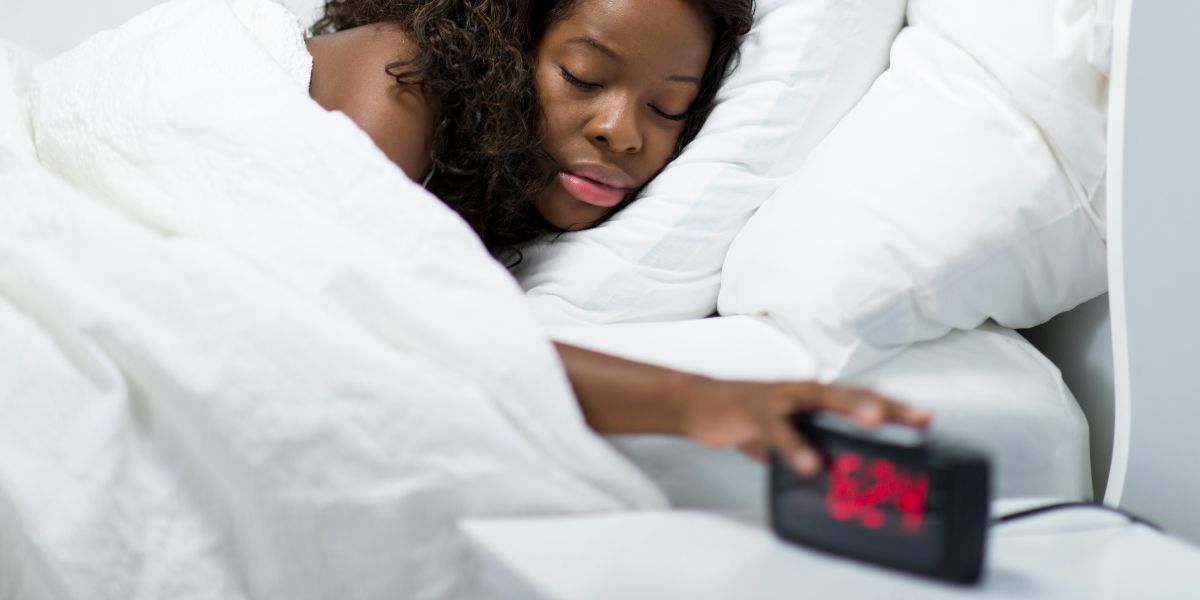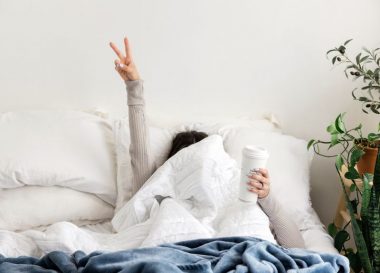Get in touch
Thanks for getting in touch

Are you a snooze button abuser?
Is it ok to hit that Snooze button . . . . . or not?
It’s completely normal to want to hit the snooze button, 1 in 3 of us do it, to remain in a comfortable bed for just a little bit longer, off again into precious sleep, the number one pillar of health. But what does the sign science say about an extra 10 or 20 minutes comfortable bed napping compared to jumping up and getting on with the day.
Well, you may be surprised!
Before we head off into dreamland let’s clarify snoozing here, in this case being different from short daytime napping, the snoozing being referred to in this article is additional short naps at the end of our night sleep, this usually involves hitting a snooze button on our alarm clock.

In order to understand what affects snoozing has at the end of our night’s sleep, we need to look at the architecture of sleep, all the stages of sleep cycles we go through each night.
It has long since been understood that sleep is the most important pillar of health, poor sleep patterns are responsible for long-term serious health issues, Dr Matthew Walker English a sleep specialist believes that “sleep is not a disposable luxury, it’s a non-negotiable biological necessity”
The first part of the sleep cycle we lay our head down on the pillow and drift off into light sleep, our heart rate slows down and our body temperature drops, we then drop down into deeper sleep and into non-REM deep sleep, this stage is incredibly important, is the period of sleep when our body is hard at work regrowing tissue, building bone and muscle and strengthening your immune system, it’s our physical restorative sleep stage. We tend to spend more time in this stage at the first part of the night.
We then move into REM sleep, during REM (which stands for rapid eye movement) our brain is highly active, studies have shown that our mind is 80% as active as it is when it’s doing cognitive work whilst awake, this is when we dream, a really cool system within the body triggers parts of the body to go into a condition of paralysis and so we don’t live out our dreams, REM sleep is highly restorative, and getting enough is crucial for feeling sharp and focused the following day.
We cycle through the different stages of sleep in 90-minute cycles, but we spend more time in REM sleep in the second part of the night. REM sleep is our mental restorative sleep stage, it’s the stage that organises all the things in our minds into folders just like a computer system.
So, what does this have to do with hitting the snooze button?
When your alarm goes off in the morning we are nearing the end of our final REM cycle, wake up and get straight out of bed and the REM cycle ends, but hit the snooze button and we go back into REM sleep for 10 minutes, the alarm goes off again and wakes us up in the middle of REM sleep, we continue this process until we finally get up and as a result, feel groggy and disorientated.
Regularly hitting the snooze button will affect your circadian rhythm, your body’s internal clock which is proven to be detrimental to long term health.

Unfortunately for many, we should try to hit the snooze button as infrequently as possible
To prevent this, we need to understand exactly why you’re hitting the snooze button in the first place.
Are you going to bed early enough? We need We need approximately 7 ½hours sleep per night, which is 5 cycles of 90 minutes. So, start from the time you need to wake up and count back 7 ½ hours to establish your optimum sleep time. We probably need to be getting ourselves ready for bed, reducing screen time and audible stimulation 60 minutes leading up to this sleep time, and certainly in bed 30 minutes before this sleep time.
Are you exercising regularly? Study after study shows that people who exercise tend to sleep better than those who don’t. Schedule it in your day to spend 30 minutes each day on some form of exercise, it will not only improve your sleep it will improve your mood.
Is your sleep environment comfortable? Our body temperature has to drop a few degrees for us to be able to sleep, which is why we find it so hard in periods of hot weather. Keep your room quiet, dark, and as cool as possible, close your curtains during the day when it’s sunny and lift them and open your windows when the sun goes down? in the evening too cool your room.
Are you preparing yourself to sleep? If you are downing an expression expresso, or doom scrolling through Instagram as you try to nod off, you are making it harder for yourself to fall asleep. Taking a bath or shower, reading, or writing or meditating will all help you feel calmer and more relaxed and aid a better night’s sleep.
So how do we break the habit? The answer is pretty simple, you might not like it, you just get out of bed, as soon as the alarm goes off, and if you really struggle to resist that snooze button then the best method is the age-old trick of putting your alarm clock on the other side of your bedroom, far away from your bed, try it, it never fails to work.
Final note: I’m an early riser getting up each day at 5:30am but the truth is I’m also a snooze button abuser, and have been for a number of years, my alarm goes off at 5:10am each morning and I have two bouts of 10 minutes snoozing, which I really enjoy.
This article has come about after recently reading about the effects of snoozing, so I made a note to myself to research this and write a piece on this subject, so this article is not only for the benefit of those who choose to read it, but is the catalyst for me to, from this point onwards I’m going to hold off from extending my right arm out each morning and buying additional sleep that doesn’t actually help.

Sadly, my snooze days are over.
If you are a snooze button abuser like me, then why don’t you join me in this new routine, any change like this definitely works on the 1% Rule of personal improvement and working on ourselves for ourselves will always make us feel better about our own personal development.
If you want advice or help in any area of personal development, then contact me for further information – nicky@nickyforster.com
